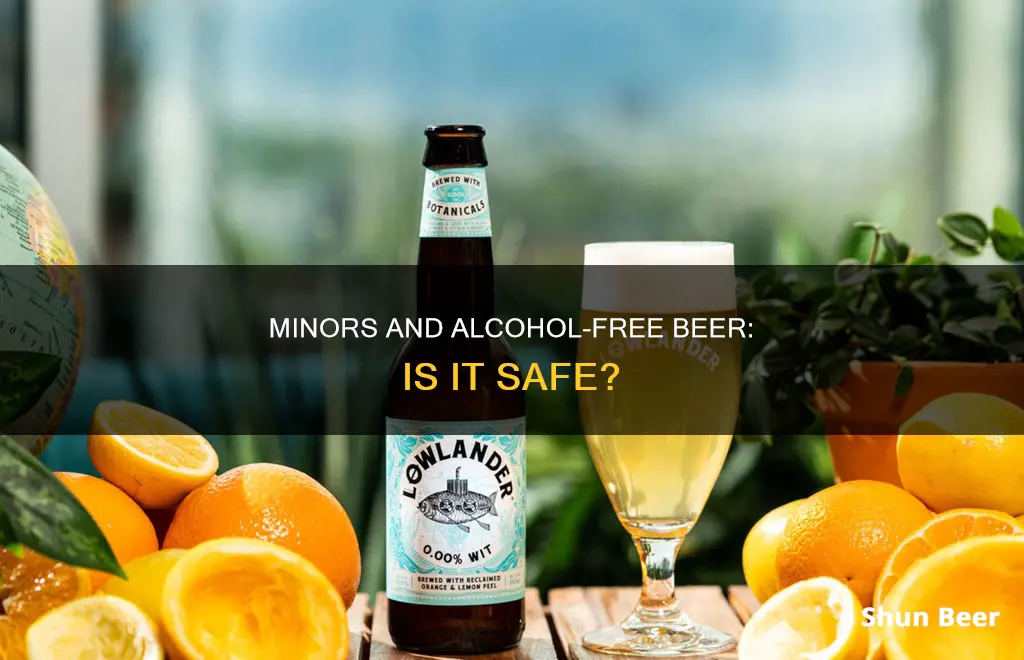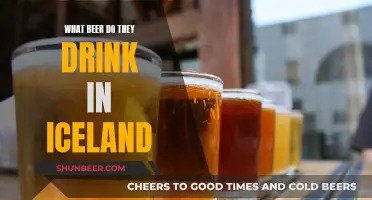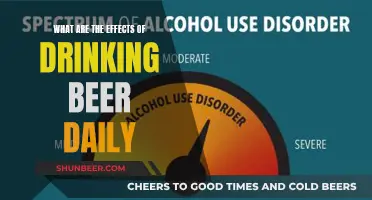
Alcohol-free beer is a divisive topic when it comes to minors. While it is illegal for minors to purchase or consume alcohol, the emergence of non-alcoholic beer has blurred the lines. Non-alcoholic beer typically contains less than 0.5% ABV, which is considered a very low level of alcohol. In many places, minors are allowed to purchase and consume non-alcoholic beer, as it is not classified as an alcoholic beverage. However, some jurisdictions restrict any product containing alcohol to those of legal drinking age. Even within a country, laws may vary by state or even by store. For example, in the United States, some states allow minors to purchase and consume non-alcoholic beer, while others may restrict it. Ultimately, the answer depends on local laws and regulations, and it is essential to check the specific regulations in your area.
What You'll Learn
- Alcohol-free beer may still contain small amounts of alcohol
- Alcohol-free beer is often treated like alcoholic beer by retailers
- Alcohol-free beer may appeal to minors and spark an interest in drinking
- Minors drinking alcohol-free beer in pubs may be hard to police
- Alcohol-free beer may be considered a gateway to alcoholic drinks

Alcohol-free beer may still contain small amounts of alcohol
Research suggests that many non-alcoholic beers contain more alcohol than their labels indicate. One study found that 29% of no- or low-alcohol beers tested had higher alcohol levels than stated on the label. Of the zero-alcohol beers sampled, six were found to have alcohol levels higher than one percent. This discrepancy can have significant implications, especially for certain populations such as pregnant individuals and those with alcohol use problems.
The presence of alcohol in non-alcoholic beer poses a risk during pregnancy. According to the American College of Obstetrics and Gynecology (ACOG), pregnant individuals should avoid any alcohol consumption to prevent fetal alcohol spectrum disorder (FASD). Even low levels of alcohol use during pregnancy can increase the risk of birth defects, including low body weight, facial abnormalities, physical problems, and neurobehavioral disorders. Therefore, it is recommended that pregnant or trying-to-conceive individuals avoid non-alcoholic beers due to the potential presence of unsafe amounts of alcohol.
In addition to the health risks, the consumption of non-alcoholic beer by minors is a concern. While it may not be illegal for minors to drink non-alcoholic beer in some places, it is generally discouraged. The reason for this discouragement is the fear that non-alcoholic beer could spark an interest in drinking among underage individuals. Research supports this concern, as studies have shown that "youngsters who start drinking during puberty are more likely to develop alcohol dependence issues." Therefore, it is advised that adults do not recommend non-alcoholic beer to minors and that minors refrain from consuming it.
Beer and Bland Diets: What You Need to Know
You may want to see also

Alcohol-free beer is often treated like alcoholic beer by retailers
From a legal standpoint, the lines between non-alcoholic and alcoholic beverages can be blurred. While federal law in the US permits minors to buy non-alcoholic beer, state laws vary, with some states allowing both the purchase and consumption by minors, while others impose restrictions. This inconsistency creates confusion for retailers, who may choose to play it safe by treating alcohol-free beer as a regulated product.
Additionally, non-alcoholic beer typically contains trace amounts of alcohol, usually less than 0.5% ABV. This means that alcohol-free beer is not entirely free of alcohol, and there have been instances where these beverages exceeded the legal limit of 0.5% ABV. As a result, retailers may be cautious and treat these drinks as if they were alcoholic to avoid potential legal issues.
Health considerations also play a role in how retailers treat alcohol-free beer. While non-alcoholic beer is generally considered safer than regular beer, some experts argue that minors should avoid consuming it. The concern is that drinking alcohol-free beer may spark an interest in alcohol among underage individuals, potentially leading to harmful drinking habits and an increased risk of alcohol dependence issues later in life. Retailers, aiming to promote responsible consumption, may contribute to this precautionary approach by treating alcohol-free beer as they would regular beer.
Furthermore, consumer perception and demand influence how retailers treat alcohol-free beer. Traditionally, non-alcoholic beer has been associated with specific demographics, such as retired individuals, older adults, or those recovering from alcoholism. However, with the rise of wellness trends and sobriety curiosity, a new generation of consumers is embracing alcohol-free options. This shift in consumer behaviour has led to an increase in demand for these products, with some companies specifically targeting younger, health-conscious adults. Retailers are responding to this evolving market by positioning alcohol-free beer as a trendy, fashionable choice, akin to its alcoholic counterpart. This strategic marketing aligns alcohol-free beer with the image and treatment of regular beer in the eyes of retailers.
In summary, the treatment of alcohol-free beer as alcoholic beer by retailers is influenced by legal complexities surrounding the product, health considerations for minors, and shifting consumer trends and demands. While non-alcoholic beer offers a healthier alternative to regular beer, retailers navigate a complex landscape of regulations, health concerns, and consumer perceptions, which ultimately shapes how they treat and position these beverages in the market.
Blood Thinners and Beer: Safe or Not?
You may want to see also

Alcohol-free beer may appeal to minors and spark an interest in drinking
Alcohol-free beer is a growing market, with some reports suggesting that non-alcoholic beer could make up 8% of all beer sales in some national chains. The popularity of these drinks is due to a number of factors, including an increased awareness of health and the negative effects of alcohol, such as hangovers and long-term health issues.
However, the emergence of non-alcoholic beer has blurred the lines when it comes to minors and drinking. While it is, of course, illegal for children to drink alcohol, and for stores to sell it to them, the laws surrounding non-alcoholic beer are more complex. In some places, such as certain US states, there is no age restriction on the purchase of non-alcoholic beer, as it contains very low levels of alcohol (less than 0.5% ABV). In other places, any drink containing alcohol, even in trace amounts, is restricted to those over the legal drinking age.
The issue is further complicated by the fact that non-alcoholic versions of alcoholic drinks are often designed to look very similar to their alcoholic counterparts. This means that it can be hard to distinguish between the two once the drink has been served, and so some pubs and stores have a blanket ban on serving any beer to minors, even if it is alcohol-free. This is to avoid any potential issues with underage drinking and to prevent staff from being responsible for serving drinks to minors.
While non-alcoholic beer is generally considered safe for minors to consume, some have expressed concerns that it could spark an interest in drinking among those who are underage. There is also research to suggest that drinking during puberty can lead to a higher risk of developing alcohol dependence issues later in life. For this reason, it is generally recommended that adults do not encourage minors to drink non-alcoholic beer, and that minors only consume these drinks in the presence of their parents.
Working with Beer Distributors: Strategies for Mutual Success
You may want to see also

Minors drinking alcohol-free beer in pubs may be hard to police
Alcohol-free beer has become increasingly popular in recent years, with some companies investing in its production. However, the emergence of these beverages has blurred the lines when it comes to minors drinking beer. While alcohol-free beer is generally considered safe for minors to consume, the laws surrounding its purchase and consumption vary across different regions.
In the United States, non-alcoholic drinks are classed as alcoholic under federal law, which means they cannot be sold to anyone under the age of 21. However, there are exceptions in certain states, and the laws can differ from county to county or even city to city. For example, in Texas, Colorado, Maryland, Montana, New York, Oregon, Washington, Wisconsin, and Wyoming, minors can legally consume alcohol with the consent of a parent or guardian aged 21 or older in private. On the other hand, states like Alabama, Arkansas, Idaho, New Hampshire, and West Virginia prohibit any consumption of alcohol by minors.
The situation is similar in the United Kingdom, where the Licensing Act 2003 states that anything below 0.5% alcohol by volume (ABV) is not classed as an alcoholic beverage. However, individual retailers have the discretion to restrict the sale of alcohol-free beer to minors. Major supermarkets in the UK, such as Tesco, Waitrose, and Asda, enforce the Challenge 25 rule and require ID for the purchase of non-alcoholic beer. They argue that it is unethical to allow minors to purchase any alcohol-related products and that it is more practical to have the same rules for all alcoholic beverages.
The varying laws and retailer policies regarding alcohol-free beer can make it challenging for pubs and other establishments to enforce consistent rules. While it may be legal for minors to consume these beverages in certain places, pubs may still choose to restrict their sale to avoid promoting alcohol to underage individuals. Additionally, pubs may find it difficult to monitor the ABV of every non-alcoholic drink they serve, as some may contain trace amounts of alcohol.
To conclude, while alcohol-free beer may be legally consumed by minors in some regions, the laws are complex and constantly evolving. Pubs and retailers must stay informed about the latest regulations and make decisions that align with their values and local laws. The responsibility also falls on parents and guardians to research and make informed decisions about their children's consumption of these beverages.
Drinking Beer on Megabus: What You Need to Know
You may want to see also

Alcohol-free beer may be considered a gateway to alcoholic drinks
Alcohol-free beer is a beer with little to no alcohol content, usually defined as less than 0.5% alcohol by volume (ABV). The laws surrounding the sale of alcohol-free beer to minors vary across different countries and states. In some places, it is legal for minors to purchase and consume alcohol-free beer, while in others, there may be age restrictions or it may be illegal.
The question of whether alcohol-free beer should be considered a gateway to alcoholic drinks is a complex one. On the one hand, alcohol-free beer provides an alternative for people who want to enjoy the taste of beer without the side effects of alcohol. It can also be argued that alcohol-free beer has several benefits, such as reduced risk of alcohol-related illness and fewer severe hangover symptoms. Additionally, in some cultures and religions, alcohol-free beer has been permitted for consumption, contributing to its popularity.
However, there are concerns that alcohol-free beer could be a gateway to alcoholic drinks for minors. Alcohol is a psychoactive substance that can alter brain function and increase the risk of trying other drugs. While the evidence for the gateway hypothesis is mixed, some studies suggest that early alcohol use may act as a gateway to developing alcohol use disorders later in life. The National Institute on Drug Abuse (NIDA) states that alcohol can prime the brain for a heightened response to other drugs, a process known as cross-sensitization.
In the context of minors, the concern is that alcohol-free beer, despite having little to no alcohol content, could spark an interest in drinking among those who are underage. This is because alcohol-free beer tastes very similar to regular beer, and minors who are prone to testing limits may be more likely to transition to alcoholic drinks. Additionally, research has shown that youngsters who start drinking during puberty are more likely to develop alcohol dependence issues.
To conclude, while alcohol-free beer may have its benefits for adults, it is important to consider the potential risks associated with minors consuming these beverages. The similarity in taste to regular beer and the potential for it to normalize drinking behavior could make alcohol-free beer a gateway to alcoholic drinks for minors. Therefore, it is recommended that adults do not encourage or provide alcoholic or non-alcoholic beer to minors and ensure they have a healthy understanding of alcohol and its potential risks.
Beer and Sore Throats: Is It Safe to Drink?
You may want to see also
Frequently asked questions
Alcohol-free beer typically contains up to 0.5% ABV. It is not always alcohol-free, but it has a very low level of alcohol.
The answer depends on local laws and regulations. In some areas, minors can legally consume alcohol-free beer because it is not classified as an alcoholic beverage. However, in other jurisdictions, any drink that contains any amount of alcohol may be restricted to those of legal drinking age.
Some places restrict the sale of alcohol-free beer to minors because it is designed for adults and could spark an interest in drinking among those who are underage. Additionally, alcohol-free beer often has similar packaging to its alcoholic equivalent, which could be seen as promoting alcohol to children.
According to the law in some places, minors who are about to turn the legal drinking age can have alcoholic drinks under the supervision of their parents. Therefore, if a minor wants to drink alcohol-free beer, they may need to do so in the presence of their parents.







